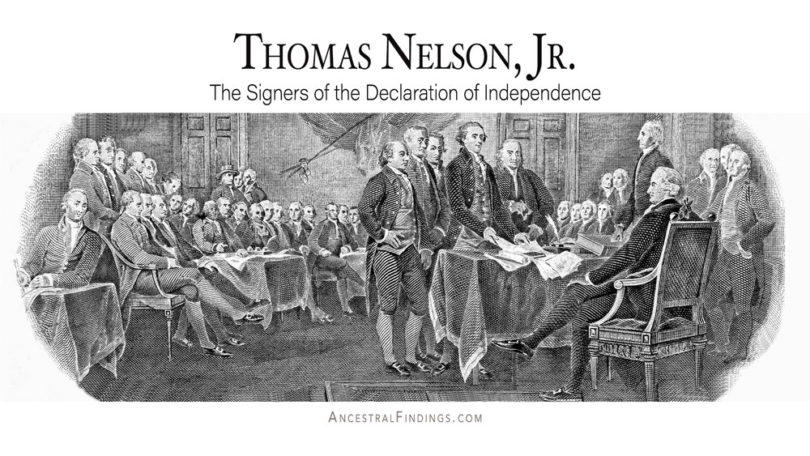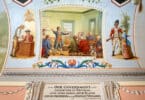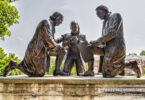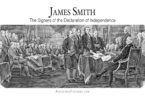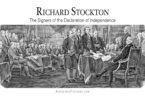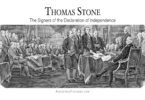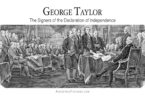Thomas Nelson, Jr was born in 1738 at Yorktown, Virginia. He was the son of William Nelson and Elizabeth Carter Burwell (the daughter of Robert Carter and the widow of Nathaniel Burwell). He was named after his grandfather, Thomas “Scotch Tom” Nelson, who was an immigrant to Virginia from Cumberland, England, being one of the earliest settlers at Yorktown.
Thomas’s family was of the planter class, which meant they were rich, slaveholding landowners. Thomas was given an excellent education, being sent to England for it. There, he attended the Newcome’s School and then Christ’s College at Cambridge University. When he graduated from Christ’s College, he went home to Virginia, after first taking a year off to travel and soak up the manners and niceties of English high society. He came home to Virginia in 1761.
The year after his return to Virginia, Thomas married Lucy Grimes Burwell, who was born in 1743 in Virginia, and was a young widow with a few children from her first husband. They had a few children together, themselves. One of their daughters later described Lucy as someone who was “an uncommon arithmetician” who had received a “liberal education.”
When Thomas came back to Virginia, he assisted his father in operating the family’s several plantations, which included managing the slaves who were working on them. When he married Lucy, Thomas also began managing the estates that were left to her sons by her first marriage. During the American Revolution, Thomas purchased five thousand four hundred acres of land and a vaguely reported number of slaves from another of Lucy’s sons from her first marriage, who was cash-strapped at that time.
Thomas was elected to the Virginia House of Burgesses upon his return to Virginia. The position was a part-time one, and he served many terms in it. It was not uncommon at that time for men from prominent, landholding families in Virginia to be elected to political office on the basis of their wealth and family background.
There were five Virginia conventions that came before the colony became a state. These conventions were called because the residents of the colony were unhappy with the way the colonial government was being managed. Thomas was elected to represent York County at all five of these conventions, though he was unable to attend the fourth, and had to leave the fifth one early when he was elected to attend the second Continental Congress in Philadelphia. While at the Congress, he was present to sign the Declaration of Independence.
At the Continental Congress, Thomas was one man in a thirteen-member committee who were appointed to draft the form of government the proposed new nation would take. This committee wrote the Articles of Confederation.
Thomas left the Continental Congress in 1781, after being elected Governor of Virginia, succeeding Thomas Jefferson in the position.
During the Revolution, Thomas was a Brigadier General of the Lower Virginia Militia, where he was engaged in the final Siege of Yorktown. When he was serving in this position, legend has it that he personally urged George Washington (or the Marquis de Lafayette, depending on the version of the legend you are told) to fire on his (Thomas’s) own house, as the British General Cornwallis was using it for his headquarters, and even offered five guineas to the first man to hit his house.
After serving as Governor of Virginia, Thomas was elected to the Virginia House of Delegates (which used to be the Virginia House of Burgesses in colonial times, and on which he had served prior to the Revolution). He served successive terms in the House of Delegates until leaving it permanently in 1788.
Thomas died at his son’s house in Hanover County, Virginia, a couple of weeks after turning fifty, and is buried at the Grace Churchyard in Yorktown, where he had been a member of Grace Church. Nelson County, Virginia is named in his honor.
At Thomas’s funeral service, Colonel Innes made this incredible tribute to him that is still preserved. It tells us much about Thomas’s life and character:
“The illustrious General Thomas Nelson is no more! He paid the last great debt to nature, on Sunday, the fourth of the present month, at his estate in Hanover. He who undertakes barely to recite the exalted virtues which adorned the life of this great and good man, will unavoidably pronounce a panegyric on human nature. As a man, a citizen, a legislator, and a patriot, he exhibited a conduct untarnished and undebased by sordid or selfish interest, and strongly marked with the genuine characteristics of true religion, sound benevolence, and liberal policy.
Entertaining the most ardent love for civil and religious liberty, he was among the first of that glorious band of patriots whose exertions dashed and defeated the machinations of British tyranny, and gave United America freedom and independent empire. At a most important crisis, during the late struggle for American liberty, when this state appeared to be designated as the theatre of action for the contending armies, he was selected by the unanimous suffrage of the legislature to command the virtuous yeomanry of his country; in this honourable employment he remained until the end of the war; as a soldier, he was indefatigably active and coolly intrepid; resolute and undejected in misfortunes, he towered above distress, and struggled with the manifold difficulties to which his situation exposed him, with constancy and courage.
In the memorable year 1781, when the whole force of the southern British army was directed to the immediate subjugation of this state, he was called to the helm of government; this was a juncture which indeed ‘tried men’s souls.’ He did not avail himself of this opportunity to retire in the rear of danger; but on the contrary, took the field at the head of his countrymen; and at the hazard of his life, his fame, and individual fortune, by his decision and magnanimity, he saved not only his country, but all America, from disgrace, if not from total ruin. Of this truly patriotic and heroic conduct, the renowned commander in chief, with all the gallant officers of the combined armies employed at the siege of York, will bear ample testimony; this part of his conduct even contemporary jealousy, envy, and malignity were forced to approve, and this, more impartial posterity, if it can believe, will almost adore.
If, after contemplating the splendid and heroic parts of his character, we shall inquire for the milder virtues of humanity, and seek for the man, we shall find the refined, beneficent, and social qualities of private life, through all its forms and combinations, so happily modified and united in him, that in the words of the darling poet of nature, it may be said: His life was gentle: and the elements so mixed in him, that nature might stand up And say to all the world—this was a man.”

